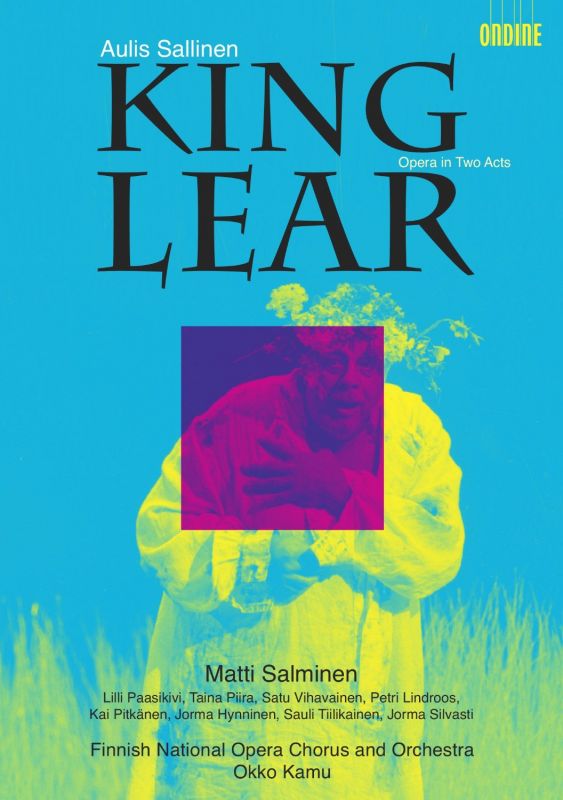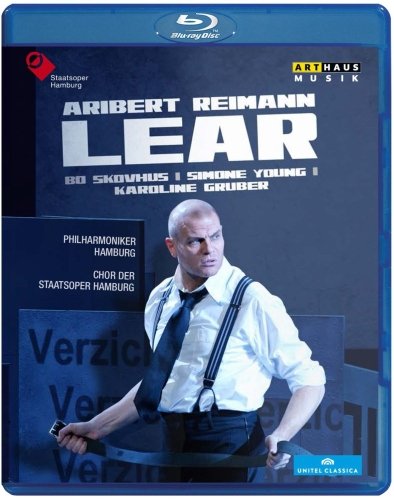REIMANN Lear; SALLINEN King Lear
View record and artist detailsRecord and Artist Details
Composer or Director: Aulis Sallinen
Genre:
Opera
Label: Ondine
Magazine Review Date: 07/2015
Media Format: Digital Versatile Disc
Media Runtime: 164
Mastering:
DDD
Catalogue Number: ODV4010

Tracks:
| Composition | Artist Credit |
|---|---|
| King Lear |
Aulis Sallinen, Composer
Aki Alamikkotervo, Fool, Tenor Aulis Sallinen, Composer Finnish National Opera Chorus Finnish National Opera Orchestra Hannu Forsberg, France, Bass Jorma Hynninen, Earl of Gloucester, Baritone Jorma Silvasti, Edmund, Tenor Kai Pitkänen, Duke of Cornwall, Tenor Lilli Paasikivi, Cordelia, Mezzo soprano Matti Salminen, King Lear, Bass Okko Kamu, Conductor Petri Lindroos, Albany, Baritone Satu Vihavainen, Regan, Soprano Sauli Tiilikainen, Edgar, Baritone Taina Piira, Goneril, Soprano |
Composer or Director: Aribert Reimann
Genre:
Opera
Label: Arthaus Musik
Magazine Review Date: 07/2015
Media Format: Blu-ray
Media Runtime: 156
Mastering:
DDD
Catalogue Number: 109 064

Tracks:
| Composition | Artist Credit |
|---|---|
| Lear |
Aribert Reimann, Composer
Andrew Watts, Edgar, Countertenor Aribert Reimann, Composer Bo Skovhus, King Lear, Baritone Christian Miedl, Duke of Albany, Baritone Erwin Leder, Narr Frieder Stricker, Servant Hamburg Philharmonic Orchestra Hamburg State Opera Chorus Hellen Kwon, Regan, Soprano Jürgen Sacher, Duke of Kent, Tenor Katja Pieweck, Goneril, Mezzo soprano Lauri Vasar, Earl of Gloucester, Baritone Martin Homrich, Edmund, Tenor Peter Galliard, Duke of Cornwall, Tenor Simone Young, Conductor Siobhan Stagg, Cordelia, Soprano Wilhelm Schwinghammer, King of France, Bass |
Author: Mike Ashman
In contrast, Reimann and Henneberg can’t wait to get going with the psychological crises. Their Lear’s score is based on quick-moving accompanied recitative with underlaying or interposed instrumental mood and atmospheric descriptions. Brass and wind have that 20th-century prominence as if they’ve swapped roles with the strings, while there’s a distinctive, large and colourful percussion group. Sallinen/Rossi, however, give themselves time to lay out character types in music (the ‘bad’ daughters are like rival prima donnas from some Mozart Singspiel) from which arias could be extracted and melodies (try the Act 2 reunion of Lear and Cordelia, and its final scene reprise) quite readily remembered. The impression, from a more Romantic strings-and-wind-based instrumental group, is altogether more lyrical, although Sallinen the colourist symphony composer can produce upsetting sonorities where necessary: try the spooky, mostly quiet ‘Forest’ in Act 2 where we first see Lear’s madness with Edgar as Poor Tom – the scene that Verdi said he was scared of composing.
The energy and pace of the Reimann bear witness to its creators’ engagement with their subject. Their version feels less a setting of another’s masterpiece than a subject they’re realising themselves. That’s emphasised in this Hamburg performance. Simone Young (and Skovhus, her virtuoso interpreter of the title-role) sculpts a more extreme, more Wozzeck-like reading of the score than Gerd Albrecht did originally (and on DG’s premiere recording – 9/79, 9/00) with a more sorrowfully lyrical Fischer-Dieskau. Young is also especially attentive to dynamics and dramatic structure. Karoline Gruber’s stage production uses well-tried Brechtian devices – for example, partners in duet not talking directly to each other, very effective in the Lear-Cordelia reunion, where Erwin Leder’s sad-faced Fool embodies Cordelia (as perhaps in stagings Shakespeare saw). This taps the mood of the play more harrowingly than the pretty Pre-Raphaelitism and naturalistic acting of Ponnelle’s premiere staging (excerpts on YouTube).
The Sallinen’s Finnish cast is impressive, albeit in a more conventional production context (Kari Heiskanen, with some influence from the too little-known Peter Brook film). I don’t know the order in which the work was composed, but Sallinen’s timing of the action seems to click into a higher gear from the end of Act 1 scene 2 where bastard Edmund ‘deposes’ Edgar from the Gloucester family inheritance. There is some classy singing from Salminen in the title-role (less physically involved than Skovhus, although his stage presence and final death fall are remarkable), Silvasti’s disturbed, neurotic Edmund, Jorma Hynninen’s less-is-more Gloucester and Lilli Paasikivi’s heart-and-soul Cordelia.
Having waited for all of the 19th century (Berlioz, then Verdi?) and much of the 20th (Britten?) for a setting of Shakespeare’s King Lear from a major operatic composer, the gods, London bus-like, suddenly delivered two in 1978 and 2000. They are both remarkable and remarkably different, and hugely recommended.
Discover the world's largest classical music catalogue with Presto Music.

Gramophone Digital Club
- Digital Edition
- Digital Archive
- Reviews Database
- Full website access
From £8.75 / month
Subscribe
Gramophone Full Club
- Print Edition
- Digital Edition
- Digital Archive
- Reviews Database
- Full website access
From £11.00 / month
Subscribe
If you are a library, university or other organisation that would be interested in an institutional subscription to Gramophone please click here for further information.




